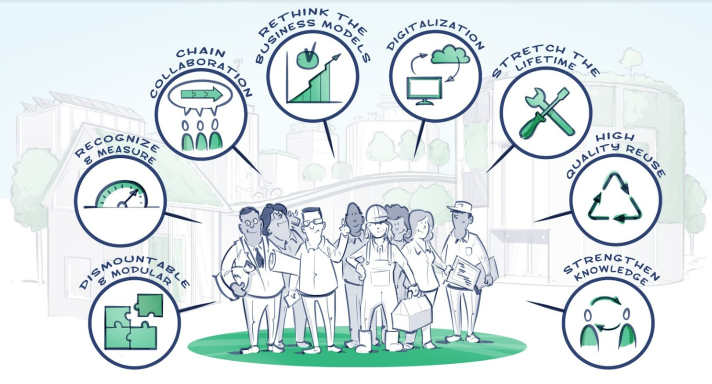Buildings are not only one of the largest assets managed by public authorities, they also have a large carbon footprint. The built environment accounts for about 50% of all extracted materials and buildings account for 36% of greenhouse gas emissions throughout the construction and use phases. Using circular strategies in the built environment can help to reduce the embodied emissions of building materials by 50%, as many EU-funded projects have shown. However, achieving a circular built environment at scale will not happen unless the workforce acquires the relevant skills and competencies to design, construct and maintain circular buildings.
Public procurers have an important role to play in the transition towards a more circular built environment and can leverage their purchasing power to stimulate demand for relevant skills. Not only can public procurers send a signal to the market by including criteria for standards, certification, or qualifications that encourage circularity in buildings, they can also provide training to their own employees and request on-site training for workers.
The EU-funded BUS Go-Circular project has developed a guide and training materials to help public authorities and policymakers better understand how they can stimulate demand for circular construction skills through public procurement and other policy levers. These two resources showcase examples from across Europe of how public authorities have already influenced construction skills.
The BUS Go-Circular project has identified the following seven actions that public procurers can take to stimulate the development of the competencies and skills needed to support a successful transition to a low-carbon and circular built environment:
- Offer internal training to staff
- Engage contractors
- Procure selective demolition and deconstruction services
- Prevent construction waste by design
- Procure maintenance, retrofiting and refurbishment services
- Include training clauses in tenders
- Include circularity skills to recruit the design team for an urban project
To learn more about these seven actions and discover best practice examples from across Europe, read the guide “Stimulating demand for circular construction skills - a guide for public authorities”, and download the “Training material for public procurers - How to procure circular construction skills?”.
Visit the EU-funded BUS Go-Circular project
Details
- Publication date
- 27 June 2023
- Author
- Directorate-General for Environment

